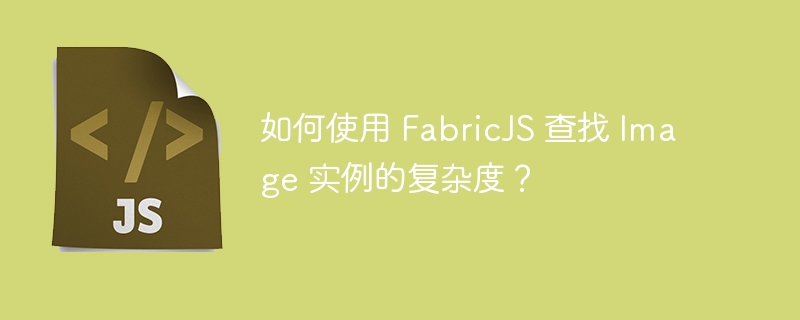Home >Web Front-end >JS Tutorial >How to find the complexity of an Image instance using FabricJS?
How to find the complexity of an Image instance using FabricJS?
- PHPzforward
- 2023-08-24 20:45:061180browse

In this tutorial we will learn how to find the Complexity of an Image instance Use FabricJS. We can create an Image object by creating an instance of fabric.Image. Since it is one of the basic elements of FabricJS, we can easily customize it as well Apply properties such as angle, opacity, etc. To find the complexity of the image For example, we use the Complexity method. This method will return 1 if the current object is Inherit directly from the base class rather than from subclasses.
grammar
complexity(): Number
UsageComplexityMethod
Example
Let's look at a code example to see the output logged when using the complexity method Gets the complexity of an Image instance. Complexity is 1 unless subclassified.
<!DOCTYPE html>
<html>
<head>
<!-- Adding the Fabric JS Library-->
<script src="https://cdnjs.cloudflare.com/ajax/libs/fabric.js/510/fabric.min.js"></script>
</head>
<body>
<h2>Using the complexity method</h2>
<p>You can open console from dev tools and see the logged output</p>
<canvas id="canvas"></canvas>
<img src="https://www.tutorialspoint.com/images/logo.png" id="img1" style="display: none" />
<script>
// Initiate a canvas instance
var canvas = new fabric.Canvas("canvas");
canvas.setWidth(document.body.scrollWidth);
canvas.setHeight(250);
// Initiating the image element
var imageElement = document.getElementById("img1");
// Initiate an Image object
var image = new fabric.Image(imageElement, {
top: 50,
left: 110,
});
// Add it to the canvas
canvas.add(image);
// Using the complexity method
console.log("The complexity of Image instance is: ", image.complexity());
</script>
</body>
</html>
Using Complexity methods to compare different objects
Example
In this example, we used the Complexity method to compare Image instances and polygon instances. You can open the console from the dev tools Seeing complexity is different.
<!DOCTYPE html>
<html>
<head>
<!-- Adding the Fabric JS Library-->
<script src="https://cdnjs.cloudflare.com/ajax/libs/fabric.js/510/fabric.min.js"></script>
</head>
<body>
<h2>Using the complexity method to compare different objects</h2>
<p>You can open console from dev tools and see the logged output</p>
<canvas id="canvas"></canvas>
<img src="https://www.tutorialspoint.com/images/logo.png" id="img1" style="display: none" />
<script>
// Initiate a canvas instance
var canvas = new fabric.Canvas("canvas");
canvas.setWidth(document.body.scrollWidth);
canvas.setHeight(250);
// Initiating the image element
var imageElement = document.getElementById("img1");
// Initiate an Image object
var image = new fabric.Image(imageElement, {
top: 50,
left: 50,
});
// Initiate a Polygon object
var polygon = new fabric.Polyline(
[
{ x: 50, y: 30 },
{ x: 105, y: 10 },
{ x: 160, y: 30 },
{ x: 100, y: 150 },
],
{
fill: "red",
left: 450,
top: 70,
}
);
// Add them both to the canvas
canvas.add(image);
canvas.add(polygon);
// Using the complexity method
console.log("The complexity of Image instance is: ", image.complexity());
console.log(
"The complexity of Polygon instance is: ",
polygon.complexity()
);
</script>
</body>
</html>
The above is the detailed content of How to find the complexity of an Image instance using FabricJS?. For more information, please follow other related articles on the PHP Chinese website!
Related articles
See more- An in-depth analysis of the Bootstrap list group component
- Detailed explanation of JavaScript function currying
- Complete example of JS password generation and strength detection (with demo source code download)
- Angularjs integrates WeChat UI (weui)
- How to quickly switch between Traditional Chinese and Simplified Chinese with JavaScript and the trick for websites to support switching between Simplified and Traditional Chinese_javascript skills

